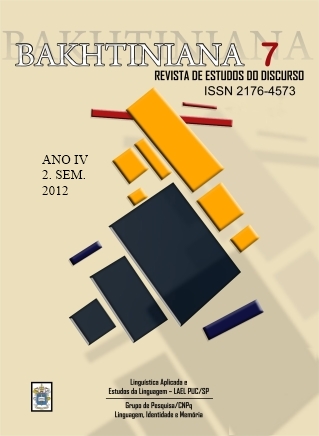A importância do grotesco
Palavras-chave:
Grotesco, Corpo, Valor cultural, Subjetividade, Humanismo, BakhtinResumo
Proponho a consideração do grotesco tanto como gênero discursivo, atitude e prática cultural, quanto como um ponto de partida que nos permite comentar mais amplamente a obra de Bakhtin relativa a Rabelais e seu significado para as discussões atuais referentes à subjetividade. No carnaval, o épico reverbera a memória ilimitada “das perturbações cósmicas passadas”, enquanto o romanesco vive na flutuação grotesca e remoção de distâncias e, por meio do riso, na celebração irreverente e alegre da resiliência. Assim como o épico, o carnaval relaciona-se com a manutenção de práticas tradicionais, porém isso ocorre de forma “romanesca”, aberta e indulgentemente incerta. O livro sobre Rabelais parece ser o ponto em que, ao reconciliar e sintetizar a cultura e a vida em atos do corpo humano, ao retrabalhar e redesenhar as barreiras de tabus culturais e ao defender uma simbiose entre o épico e o romanesco, Bakhtin advoga uma nova percepção da tradição inscrita na irreverente vida da cultura do povo (comunidade). Essa celebração das pessoas reabre a incômoda questão a respeito das implicações políticas dos pronunciamentos de Bakhtin sobre o épico e o romanesco, a cultura comunitária e a individual, e a desejada síntese entre eles. Mas ela também nos permite situar o estilo do pensamento de Bakhtin e sua específica marca de humanismo descentralizado, de fato, deslocado.Métricas
Carregando Métricas ...
Downloads
Publicado
2012-11-30
Como Citar
Tihanov, G. (2012). A importância do grotesco. Bakhtiniana. Revista De Estudos Do Discurso, 7(2), Port. 166–180 / Eng. 165. Recuperado de https://revistas.pucsp.br/index.php/bakhtiniana/article/view/11381
Edição
Seção
Artigos








